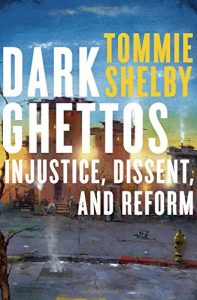I’ve been dipping into Dark Ghettos: Injustice, Dissent and Reform by Tommie Shelby. It’s a philosophy text so I’m unlikely to read the whole book – the professional language of philosophy is hard work. However, the main argument seems well worth social scientists reflecting on. Shelby’s argument is that the debate about ghettos (and he’s writing about black urban ghettos in the US but it would apply to other communities segregated by low incomes, bad housing, inadequate services, ill health, cirme etc etc) is that it is an error to see them as ‘problems’ that need fixing. The ‘what works’ debate, what he refers to as the ‘medical model’, has serious limitations. “Policymakers working within the medical model treat the background structure of society as given and focus only on alleviating the burdens of the disadvantaged.” The aim is to fit the inhabitants for greater success within an existing social system (whether you diagnose the ‘problem’ either as specific external barriers or the attitudes and/or culture of the people themsevels). “Features of society that can and should be altered get little scrutiny.”
He adds that technocratic reasoning removes the political agency of the inhabitants – and indeed blinds policymakers to the possibility that what they see as social dysfunction is in fact rational resistance to injustice. The book must have been written long before the politcal shocks of this year, but that comment about the limits of technocracy certainly strikes a chord now. This perhaps isn’t a new tension, Daniel Bell having pointed it out a generation ago, but it has reached a critical point now.

